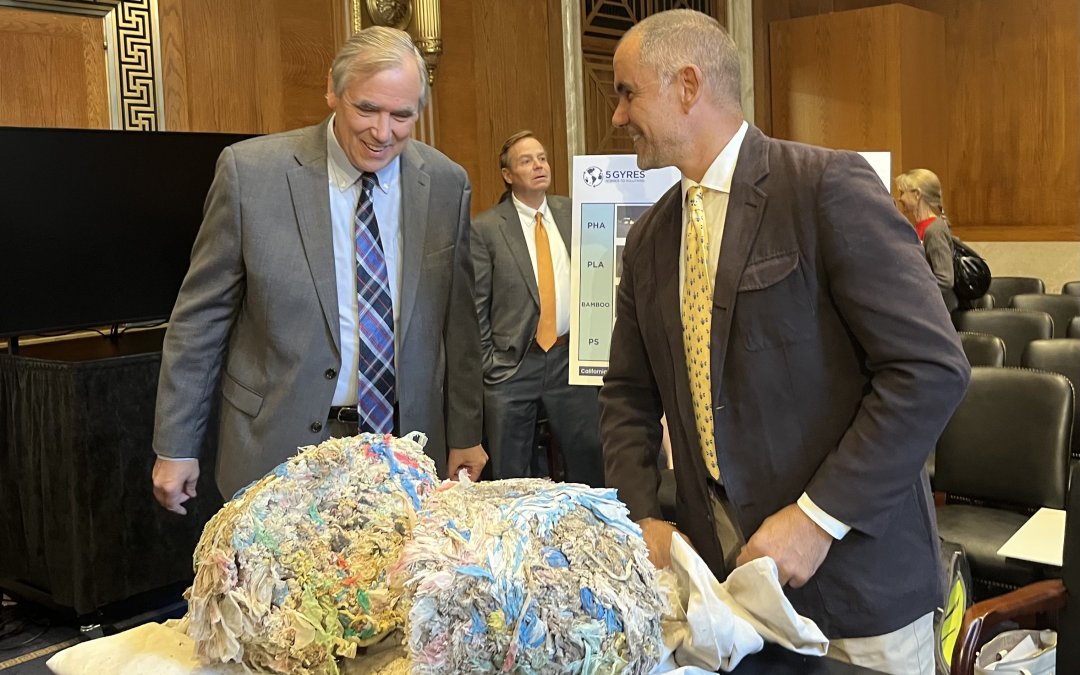WASHINGTON – “I’ll show you what I dug out of one [camel] skeleton,” said marine scientist Marcus Eriksen as he unearthed a roughly 40-pound mass that he estimated held 2,000 plastic bags.
Eriksen’s display came as he and other experts testified on potential solutions to single-use plastics pollution, encompassing varying perspectives from new materials to improved recycling, during a subcommittee hearing for the Senate Environment and Public Works on Thursday.
Eriksen, co-founder of the 5 Gyres Institute, said he has also pulled plastic bags out of hundreds of bird skeletons, and he’s had colleagues find them in whale guts too. He emphasized the global abundance of plastic waste that has risen exponentially in the last 15 years and resulted in serious health impacts for numerous species.
“These small, even nanoscale, particles are found in your bloodstream,” Eriksen said in an interview with the Medill News Service before the hearing. “They get into the placenta of mothers. It gets into the organs of humans. It even crossed the brain barrier in studies of rats and mice.”
There was also an intermittent back and forth on whether plastic bags can be recycled, illustrating the larger confusion on the country’s present recycling system and its limited efficacy.
Sen. Markwayne Mullin, R-Okla., asked about the proliferation of plastic bags in the 40-pound mass, saying that it was his understanding that plastic bags can be recycled. Sen. Sheldon Whitehouse (D-R.I.) said plastic bags cannot be recycled and that the recycling rate in general “stinks,” calling it “very, very much a failed system.”
In response, Mullin maintained that there are ways to recycle plastic bags to which Whitehouse said he had meant you can’t dispose of plastic bags in a mixed-use recycling bin.
Erin Simon, vice president and head of Plastic Waste and Business at the World Wildlife Fund, said plastic bags are technically recyclable but not recycled. Some recycling facilities do not accept plastic bags, wraps, and film in recycling bins because they clog machinery and cause safety hazards.
During the discussion, Mullin cautioned against “a knee-jerk reaction” and called for “innovation, not misguided regulation.” He highlighted the work of witness Humberto Kravetz, the founder and CEO of GSF Upcycling, a Spain-based company that recycles plastic with less energy and environmental cost by using nanomaterials.
Eriksen called for biodegradable plastics as a solution. He noted his organization’s 18-month field study that measured how 22 bioplastic items broke down in different land and marine environments with most samples degrading significantly within the timespan.
“A lot of these biomaterials, they are functional replacements, especially as a thin film,” Eriksen said in an interview before the hearing.
Eriksen also discussed the potential of regenerative materials such as seaweed and mushrooms as feedstocks for biobased materials as an alternative to plastics made from fossil fuels.
Simon noted the need for caution when considering the tradeoffs of switching to alternative materials, emphasizing that steps can be taken when sourcing alternatives to ensure there are more environmental and social benefits compared to conventional plastic.
Whitehouse argued that an economic component needs to be added to the technical conversation to provide incentives by reaching a point where recycled materials are cheaper than virgin plastic.
“If that economic signal shifts, then suddenly recycling works,” Whitehouse said, “because if there’s one rule of capitalism, it’s the profits imperative.”
According to Simon, it’s the responsibility of governments and industries to make systems work for consumers while also addressing current trends.
“All of the science tells us that, whether you’re talking about this from a pollution issue or from human health, first we need to produce less,” Simon said in an interview before the hearing. “We can’t manage what we have, let alone what we’re projected to grow to.”


